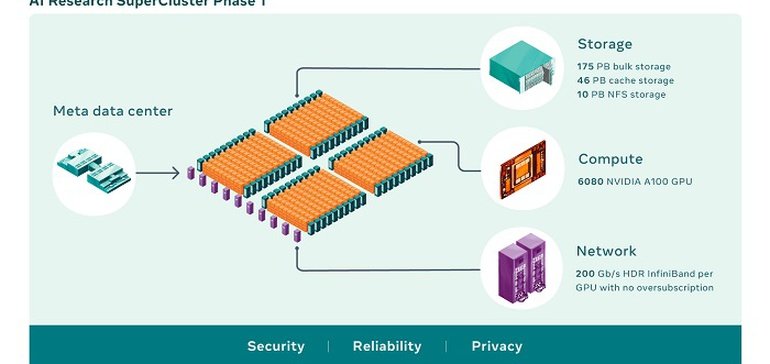SOCIAL
Meta’s Developing the World’s Fastest AI Supercomputer to Fuel its Metaverse Vision

As it looks to a future in the currently theoretical ‘metaverse’, Meta will need to up its computing power and systems in order to facilitate simultaneous connection in wholly immersive digital worlds, while it’ll also need more advanced computing power to fuel the next stage of its AI plans, in various forms.
Which is why Meta is developing a new AI Research SuperCluster (RSC), which it says will eventually become the fastest AI supercomputer in the world, when it’s fully built out by mid-2022.
The advanced system will eventually be able to perform ‘5 exaflops of mixed precision compute’ at peak. Which, I have no real idea of what that truly means, but basically, Meta’s new, advanced computational system will be able to process huge amounts of data, facilitating development in a wide range of applications, with a specific view towards the next stage of its metaverse vision.
As explained by Meta:
“RSC will help Meta’s AI researchers build new and better AI models that can learn from trillions of examples; work across hundreds of different languages; seamlessly analyze text, images, and video together; develop new augmented reality tools; and much more. We hope RSC will help us build entirely new AI systems that can, for example, power real-time voice translations to large groups of people, each speaking a different language, so they can seamlessly collaborate on a research project or play an AR game together.”
AR is clearly a key focus, with Meta developing its own AR-enabled glasses that will expand the use cases for the technology. The RSC will provide increased capacity to develop more complex AR systems, which could advance Meta’s tools beyond what’s currently available, which would ideally see its AR glasses become the top of the line, most advanced model available, helping Meta potentially dominate the space over rivals Snapchat and Apple.
Unless, of course, Snap and Apple team up, which is my prediction. But even so, with the additional computing power of the RSC behind it, Meta could still be well ahead, which could be a key step in bridging our current online experience to the next stage.
Which is where Meta is really focused:
“Ultimately, the work done with RSC will pave the way toward building technologies for the next major computing platform – the metaverse, where AI-driven applications and products will play an important role.”
It’s worth noting here that Meta specifically notes that the metaverse will take years to develop, it’s not something that’s happening overnight, nor will it become an all-immersive, integrated world by next year. Which is why any company or project that’s pitching itself as ‘metaverse ready’ is kidding itself – the metaverse, as it’s broadly envisioned, will require massive collaboration between platforms, in order to transfer your digital identity between virtual worlds, and take your avatars, skins, digital items, and more with you.
Meta is keen to reiterate that it won’t own that space, as such:
“No one company can (or should) build the metaverse alone. It will be built by people and businesses all over the world. And it’ll be important that experiences built by different companies or people, like avatars or virtual worlds, work together.”
But really, Meta is best-placed to host the party, via its industry-leading consumer VR tools and advanced computing systems like RSC, which will give it a significant advantage in dictating what the metaverse will be, and who will be able to sign up.
Eventually, this will require industry agreement on schemas and systems that will likely enable any service to join. But they’ll still need a host platform, along with software/hardware connection. Meta will be at the forefront of that aspect, which, again, will see it well-placed to define the rules of the space, and dominate the next stage of digital connection – whether it technically ‘owns’ it or not.
But it is worth noting that the metaverse does not exist yet, not in any form, and any platform or project that claims otherwise is ultimately misleading. Those NFT projects that claim to be ‘metaverse-ready’, yeah, no, maybe avoid them.
Eventually, Meta’s RSC will give it significant advantages in developing new systems for everything from combating harmful content on its platforms to building entirely new user experiences. The potential here is massive, and while it will take time to see the results of these developments, it’ll be interesting to see how Meta’s processes evolve in turn, and whether these advanced systems result in a significant acceleration in its development cycles.
You can read more technical details on Meta’s RSC project here.
SOCIAL
Snapchat Explores New Messaging Retention Feature: A Game-Changer or Risky Move?

In a recent announcement, Snapchat revealed a groundbreaking update that challenges its traditional design ethos. The platform is experimenting with an option that allows users to defy the 24-hour auto-delete rule, a feature synonymous with Snapchat’s ephemeral messaging model.
The proposed change aims to introduce a “Never delete” option in messaging retention settings, aligning Snapchat more closely with conventional messaging apps. While this move may blur Snapchat’s distinctive selling point, Snap appears convinced of its necessity.
According to Snap, the decision stems from user feedback and a commitment to innovation based on user needs. The company aims to provide greater flexibility and control over conversations, catering to the preferences of its community.
Currently undergoing trials in select markets, the new feature empowers users to adjust retention settings on a conversation-by-conversation basis. Flexibility remains paramount, with participants able to modify settings within chats and receive in-chat notifications to ensure transparency.
Snapchat underscores that the default auto-delete feature will persist, reinforcing its design philosophy centered on ephemerality. However, with the app gaining traction as a primary messaging platform, the option offers users a means to preserve longer chat histories.
The update marks a pivotal moment for Snapchat, renowned for its disappearing message premise, especially popular among younger demographics. Retaining this focus has been pivotal to Snapchat’s identity, but the shift suggests a broader strategy aimed at diversifying its user base.
This strategy may appeal particularly to older demographics, potentially extending Snapchat’s relevance as users age. By emulating features of conventional messaging platforms, Snapchat seeks to enhance its appeal and broaden its reach.
Yet, the introduction of message retention poses questions about Snapchat’s uniqueness. While addressing user demands, the risk of diluting Snapchat’s distinctiveness looms large.
As Snapchat ventures into uncharted territory, the outcome of this experiment remains uncertain. Will message retention propel Snapchat to new heights, or will it compromise the platform’s uniqueness?
Only time will tell.
SOCIAL
Catering to specific audience boosts your business, says accountant turned coach

While it is tempting to try to appeal to a broad audience, the founder of alcohol-free coaching service Just the Tonic, Sandra Parker, believes the best thing you can do for your business is focus on your niche. Here’s how she did just that.
When running a business, reaching out to as many clients as possible can be tempting. But it also risks making your marketing “too generic,” warns Sandra Parker, the founder of Just The Tonic Coaching.
“From the very start of my business, I knew exactly who I could help and who I couldn’t,” Parker told My Biggest Lessons.
Parker struggled with alcohol dependence as a young professional. Today, her business targets high-achieving individuals who face challenges similar to those she had early in her career.
“I understand their frustrations, I understand their fears, and I understand their coping mechanisms and the stories they’re telling themselves,” Parker said. “Because of that, I’m able to market very effectively, to speak in a language that they understand, and am able to reach them.”Â
“I believe that it’s really important that you know exactly who your customer or your client is, and you target them, and you resist the temptation to make your marketing too generic to try and reach everyone,” she explained.
“If you speak specifically to your target clients, you will reach them, and I believe that’s the way that you’re going to be more successful.
Watch the video for more of Sandra Parker’s biggest lessons.
SOCIAL
Instagram Tests Live-Stream Games to Enhance Engagement

Instagram’s testing out some new options to help spice up your live-streams in the app, with some live broadcasters now able to select a game that they can play with viewers in-stream.
As you can see in these example screens, posted by Ahmed Ghanem, some creators now have the option to play either “This or That”, a question and answer prompt that you can share with your viewers, or “Trivia”, to generate more engagement within your IG live-streams.
That could be a simple way to spark more conversation and interaction, which could then lead into further engagement opportunities from your live audience.
Meta’s been exploring more ways to make live-streaming a bigger consideration for IG creators, with a view to live-streams potentially catching on with more users.
That includes the gradual expansion of its “Stars” live-stream donation program, giving more creators in more regions a means to accept donations from live-stream viewers, while back in December, Instagram also added some new options to make it easier to go live using third-party tools via desktop PCs.
Live streaming has been a major shift in China, where shopping live-streams, in particular, have led to massive opportunities for streaming platforms. They haven’t caught on in the same way in Western regions, but as TikTok and YouTube look to push live-stream adoption, there is still a chance that they will become a much bigger element in future.
Which is why IG is also trying to stay in touch, and add more ways for its creators to engage via streams. Live-stream games is another element within this, which could make this a better community-building, and potentially sales-driving option.
We’ve asked Instagram for more information on this test, and we’ll update this post if/when we hear back.
-

 MARKETING6 days ago
MARKETING6 days agoRoundel Media Studio: What to Expect From Target’s New Self-Service Platform
-

 SEO6 days ago
SEO6 days agoGoogle Limits News Links In California Over Proposed ‘Link Tax’ Law
-
SEARCHENGINES6 days ago
Daily Search Forum Recap: April 12, 2024
-

 SEO5 days ago
SEO5 days ago10 Paid Search & PPC Planning Best Practices
-

 SEARCHENGINES5 days ago
SEARCHENGINES5 days agoGoogle Core Update Volatility, Helpful Content Update Gone, Dangerous Google Search Results & Google Ads Confusion
-

 SEO7 days ago
SEO7 days agoGoogle Unplugs “Notes on Search” Experiment
-

 MARKETING5 days ago
MARKETING5 days ago2 Ways to Take Back the Power in Your Business: Part 2
-

 PPC6 days ago
PPC6 days agoCritical Display Error in Brand Safety Metrics On Twitter/X Corrected













You must be logged in to post a comment Login